第27章 CHAPTER V.(1)
THE STORM.
A VIOLENT thunderstorm, with a deluge of rain, broke upon our camp upon the banks of the Atbara, fortunately just after the tents were pitched. We thus had an example of the extraordinary effects of the heavy rain in tearing away the soil of the valley.
Trifling watercourses were swollen to torrents; banks of earth became loosened and fell in, and the rush of mud and water upon all sides swept forward into the river with a rapidity which threatened the destruction of the country, could such a tempest endure for a few days. In a couple of hours all was over. The river was narrower than in its passage through the desert, but was proportionately deeper. The name of the village on the opposite bank was Goorashee, with which a means of communication had been established by a ferry-boat belonging to our friend and late host, Malem Georgis, the Greek merchant of Cassala. He had much trouble in obtaining permission from the authorities to introduce this novelty, which was looked upon as an innovation, as such a convenience had never before existed. The enterprising proprietor had likewise established a cotton farm at Goorashee, which appeared to succeed admirably, and was an undeniable example of what could be produced in this fertile country were the spirit of improvement awakened. Notwithstanding the advantage of the ferry-boat, many of the Arabs preferred to swim their camels across the river to paying a trifle to the ferryman. Acamel either cannot or will not swim unless it is supported by inflated skins: thus the passage of the broad river Atbara (at this spot about 300 yards wide) is an affair of great difficulty.
Two water-skins are inflated, and attached to the camel by a band passed like a girth beneath the belly. Thus arranged, a man sits upon its back, while one or two swim by the side as guides. The current of the Atbara runs at a rapid rate; thus the camel is generally carried at least half a mile down the river before it can gain the opposite bank. A few days before our arrival, a man had been snatched from the back of his camel while crossing, and was carried off by a crocodile. Another man had been taken during the last week while swimming the river upon a log. It was supposed that these accidents were due to the same crocodile, who was accustomed to bask upon a mud bank at the foot of the cotton plantation. On the day following our arrival at the Atbara, we found that our camel-drivers had absconded during the night with their camels; these were the men who had been forced to serve by the Governor of Cassala. There was no possibility of proceeding for some days, therefore I sent El Baggar across the river to endeavour to engage camels, while I devoted myself to a search for the crocodile. I shortly discovered that it was unfair in the extreme to charge one particular animal with the death of the two Arabs, as several large crocodiles were lying upon the mud in various places. A smaller one was lying asleep high and dry upon the bank; the wind was blowing strong, so that, by carefully approaching, I secured a good shot within thirty yards, and killed it on the spot by a bullet through the head, placed about an inch above the eyes.
After some time, the large crocodiles, who had taken to the water at the report of the gun, again appeared, and crawled slowly out of the muddy river to their basking-places upon the bank. Acrocodile usually sleeps with its mouth wide open; I therefore waited until the immense jaws of the nearest were well expanded, showing a grand row of glittering teeth, when I crept carefully towards it through the garden of thickly-planted cotton. Bacheet and Wat Gamma followed in great eagerness. In a short time Iarrived within about forty yards of the beast, as it lay upon a flat mud bank formed by one of the numerous torrents that had carried down the soil during the storm of yesterday. The cover ceased, and it was impossible to approach nearer without alarming the crocodile; it was a fine specimen, apparently nineteen or twenty feet in length, and I took a steady shot with the little Fletcher rifle at the temple, exactly in front of the point of union of the head with the spine. The jaws clashed together, and a convulsive start followed by a twitching of the tail led me to suppose that sudden death had succeeded the shot; but, knowing the peculiar tenacity of life possessed by the crocodile, I fired another shot at the shoulder, as the huge body lay so close to the river's edge that the slightest struggle would cause it to disappear. To my surprise, this shot, far from producing a quietus, gave rise to a series of extraordinary convulsive struggles. One moment it rolled upon its back, lashed out right and left with its tail, and ended by toppling over into the river.
This was too much for the excitable Bacheet, who, followed by his friend, Wat Gamma, with more courage than discretion, rushed into the river, and endeavoured to catch the crocodile by the tail.
Before I had time to call them back, these two Arab water-dogs were up to their necks in the river, screaming out directions to each other while they were feeling for the body of the monster with their feet. At length I succeeded in calling them to shore, and we almost immediately saw the body of the crocodile appear belly upwards, about fifty yards down the stream; the forepaws were above the water, but, after rolling round several times, it once more disappeared, rapidly carried away by the muddy torrent.